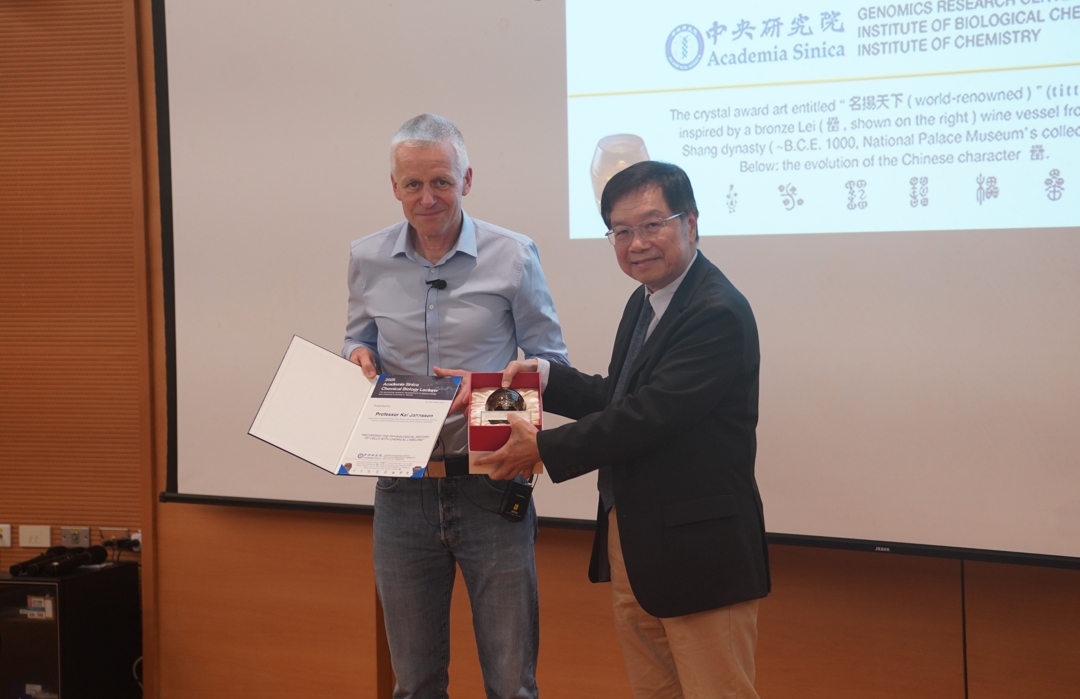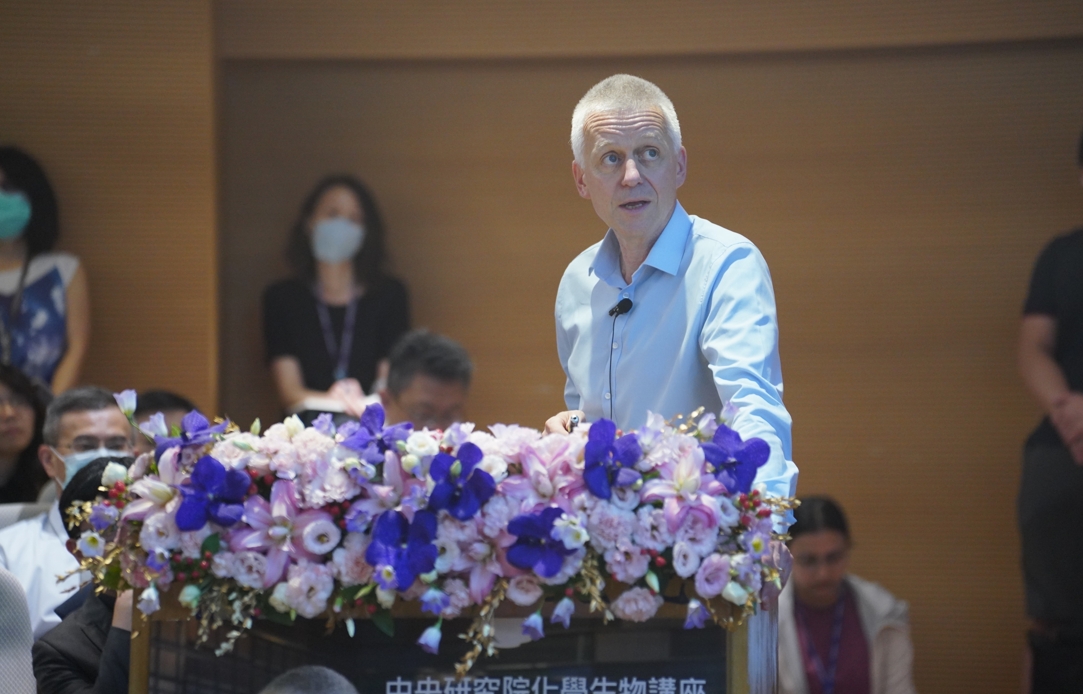Date: 2025-05-20
On May 20, Academia Sinica hosted the inaugural Academia Sinica Chemical Biology Lecturer – Professor Kai Johnsson, Director of the Department of Chemical Biology at the Max Planck Institute for Medical Research in Germany. Vice President Tang K. Tang, acting on behalf of Academia Sinica, presented a certificate to Dr. Johnsson, commemorating the lectureship.
Professor Johnsson is internationally renowned for his pioneering work in live-cell protein labeling. In his lecture, entitled “Recording the Physiological History of Cells with Fluorescent Labeling,” he presented the innovative chemical tools developed by his team to track dynamic cellular events. The lecture, held in Academia Sinica’s Genomics Research Center, drew nearly 200 attendees from a wide range of academic backgrounds.
A pioneer in chemical biology, Professor Johnsson has developed cutting-edge methods for protein labeling in living cells, most notably the widely adopted SNAP-tag and CLIP-tag systems1. These technologies have become invaluable in biological research, enabling significant advancements in the study of protein interactions, receptor activation, and cellular dynamics. Professor Johnsson's outstanding contributions have earned him several prestigious awards, including the EPFL Innovation Award, the Novartis Lectureship Award, and the Karl-Heinz Beckurts Prize. He is also a member of the European Molecular Biology Organization (EMBO) and a fellow of the Heidelberg Academy of Sciences and Humanities.
In his talk, Professor Johnsson highlighted the limitations of traditional static observations in cellular research and introduced his team’s chemical labeling technology. This technology allows for the time-resolved tracking of cellular activities by using engineered proteins and fluorescent substrates. The technology has been successfully applied to monitor dynamic cellular processes such as protein–protein interactions, receptor activation, calcium ion fluctuations, and kinase activity. Additionally, the technology has been extended to studies in transcriptomics and in vivo neuronal activities.
Professor Johnsson also shared his interdisciplinary approach, which combines chemical synthesis, protein engineering, and cell biology to develop semi-synthetic biosensors and novel fluorescent probes. He emphasized the significance of these advancements for both fundamental biological research and potential clinical applications.
The Academia Sinica Chemical Biology Lecturer was established in 2024 through the generous donation of Academician Chi-Huey Wong, Joint Appointment Distinguished Research Fellow at the Genomics Research Center, Academia Sinica. The lectureship aims to promote research and talent development in Taiwan’s biotechnology and chemical sciences. Each year, a distinguished scholar in the field of chemical biology is invited to share their latest research, promote academic exchange, and inspire the next generation of scientists. This event was co-organized by the Genomics Research Center, the Institute of Biological Chemistry, and the Institute of Chemistry at Academia Sinica.
1 The SNAP-tag and CLIP-tag systems are derived from the human DNA repair enzyme O6-alkylguanine-DNA alkyltransferase (AGT), enabling covalent protein labeling in live cells using chemical probes such as O6-benzylguanine and O2-benzylcytosine derivatives.
-
Ms. Pei-Shan Chien, Genomics Research Center, Academia Sinica
(02)2787-1286,pschien@as.edu.tw
-
Ms. Tsuey-Yin Piong, Media & Public Affairs, Secretariat, Academia Sinica
(02) 2789-8821,fangzi@as.edu.tw
-
Ms. Steffi Tung Lin, Media & Public Affairs, Secretariat, Academia Sinica
(02) 2789-8820,tunglin@as.edu.tw
-
 Vice President Tang K. Tang, acting on behalf of Academia Sinica, presented a certificate to Professor Kai Johnsson, commemorating the lectureship. Photo credit: Genomics Research Center, Academia Sinica.
Vice President Tang K. Tang, acting on behalf of Academia Sinica, presented a certificate to Professor Kai Johnsson, commemorating the lectureship. Photo credit: Genomics Research Center, Academia Sinica.
-
 Professor Kai Johnsson gave a speech entitled “Recording the Physiological History of Cells with Fluorescent Labeling”. Photo credit: Genomics Research Center, Academia Sinica.
Professor Kai Johnsson gave a speech entitled “Recording the Physiological History of Cells with Fluorescent Labeling”. Photo credit: Genomics Research Center, Academia Sinica.









 Home
Home
